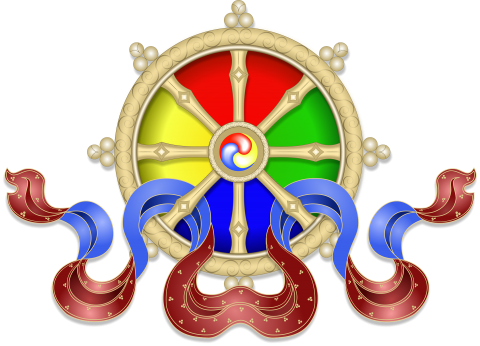 Submitted by Kartr on
Submitted by Kartr on

Image by Br Yonten Phuntsok from http://Pixabay.com
The word ‘Dharma’ originated in the ancient Sanskrit language, and its basic meaning is ‘protection’, (in a pro-active sense) and ’decree or custom’. Dharma translates as ‘the way things are’, ‘the law of nature’ or ‘that which sustains the Universe’.
In Buddhism, Dharma is the Universal truth common to all individuals at all times, and is regarded to be one of the primary sources of Buddhist practice and doctrine.
Dharma is a cosmic principle and process. Our dharma is our true and right place in time and space, thought and awareness, action, deed and desire. Dharma may suggest a code of conduct and is said to be a ‘moral virtue’ and ‘right living’ as well as the eternal life force. Dharma is the essential principle of the natural law of the Cosmos.
Dharma dictates absolute honour for all living things and the land that nourishes them. This is based on the idealistic premise that mankind will rise to its own innate, sacred ‘goodness’ when shown the way to its spiritual path to enlightenment. It is said that dharma is the only true path to enlightenment. It is dharma by which the seeker of truths is able to evolve.
Dharma is the path of righteousness and living one’s life according to their codes of conduct. Dharma is to see the essence of each situation and act in such a way as to manifest the highest Divine good.
Your ‘dharma’ is the Divine plan of your soul and is your reason for ‘being’. It is your duty to be who you truly are in every way, and fulfill your true potential and destiny. Everyone has a path they must follow in order to uphold righteousness and lead to their individual spiritual enlightenment and salvation. Dharma is a person’s duty and the actions deemed to be fit, carried out according to their personal responsibilities and soul mission.
The principle of dharma determines that in order to fulfill our Divine role and soul purpose, we must behave within our personal dharma, which involves doing the right thing at the right time, in the right way and for the right reason/s. By maintaining our dharma we attain balance within.
Dharma is the moral law combined with spiritual discipline that guides one’s life, and is considered to be the very foundation of life. Dharma is the ‘Law of Being’.
When we live outside the bounds of our own Divine dharma, we are out of sync with the Universe, and we pay the price in the form of stress, bitterness, frustration, misery and sadness, regardless of how much material wealth and/or success we may have accumulated.
Reincarnation determines the state of an individual in the next lifetime or existence. This is ‘Karma’, which refers to the actions undertaken by the mind and body. In order to achieve ‘good karma’ it is important to live a life according to dharma, which refers to ‘living right’. This involves doing what is ‘right’ for the individual, the family and community, the world and Universe as a whole. Dharmic laws govern not only the individual, but all human and beings of the Cosmos. Going against your dharma creates ‘bad’ or ‘negative karma’. Dharma affects the future according to the accumulated karma.
Everything that helps and assists humans to become enlightened and spiritually based is dharma. All that hinders this process is ‘adharma’. ‘Adharma’ is considered to be negative, dark or demonic forces.
Living a dharmic path or lifestyle entails expressing such traits as austerity, purity, compassion, honesty and truthfulness, patience, forgiveness, self-discipline, sanctity, reason, learning and/or knowledge, and absence of anger.
The practice of dharma gives an experience of joy, inner-strength, peace and tranquility within the Self, and makes life ordered and disciplined.
Joanna Walmsley
https://hubpages.com/religion-philosophy/dharmawhatisdharma
Originally posted by LFN Member Namaste
- 977 reads